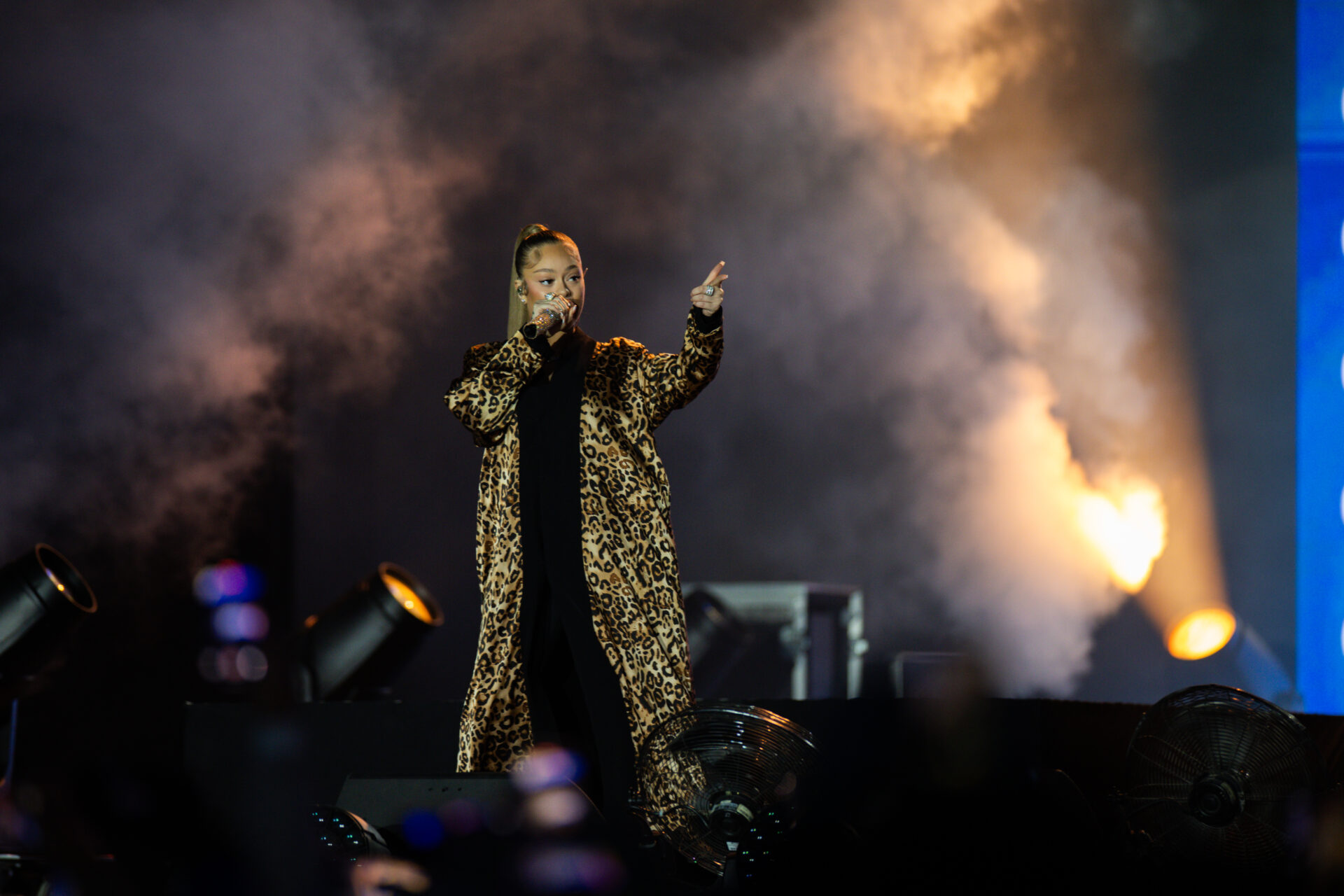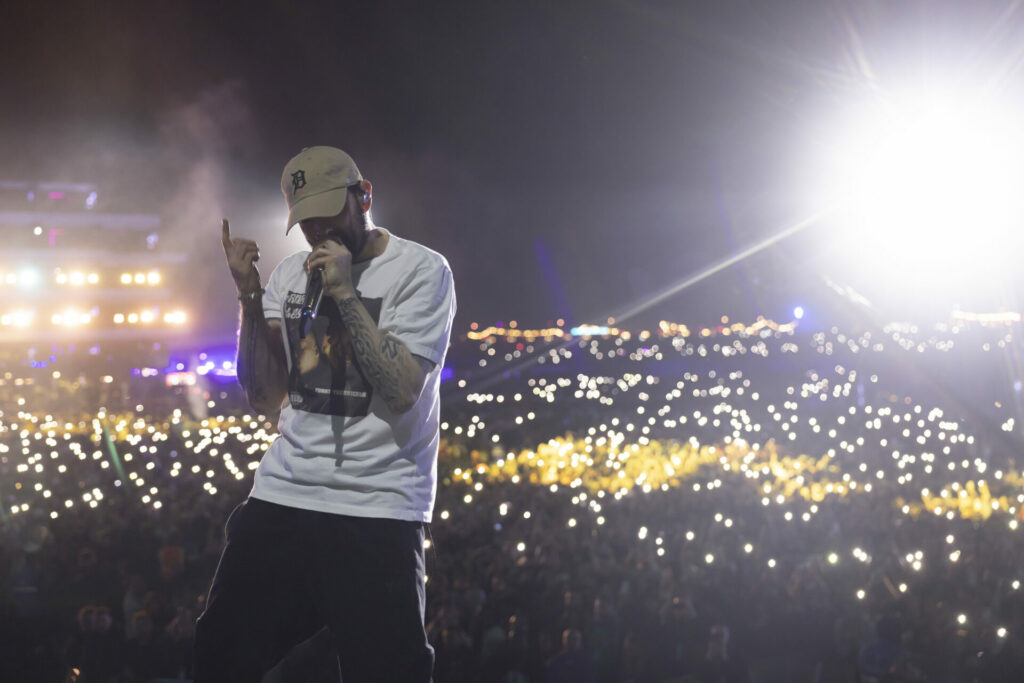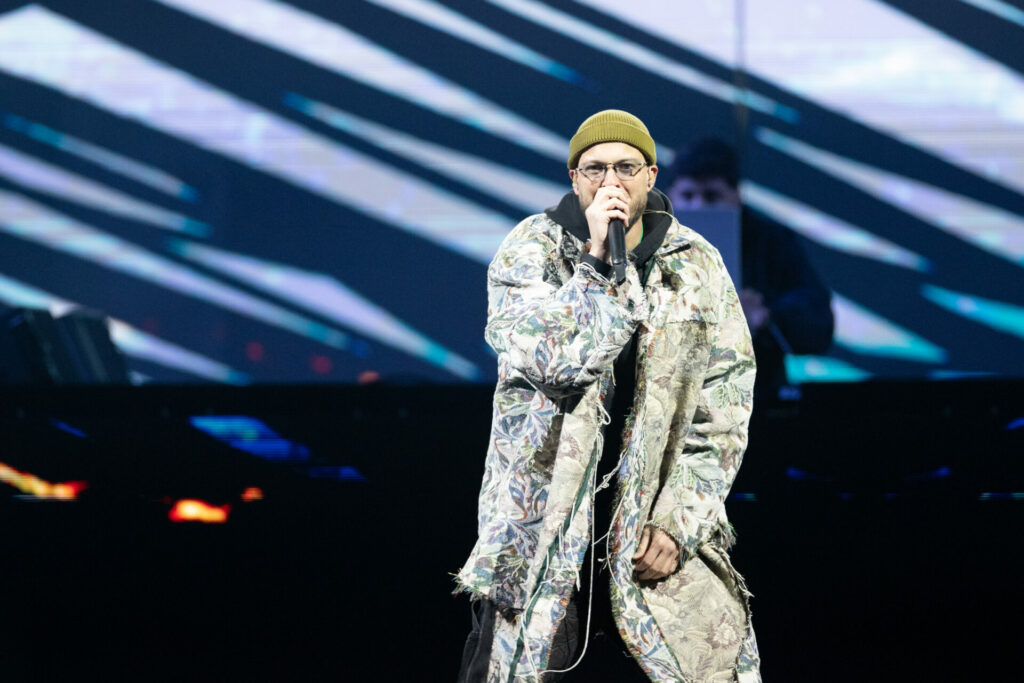How Soundstorm is changing preconceptions of music in the Middle East
This Middle East festival is transforming live music in the region.
By Susan Hansen

The landscape is flat and dry. It continues for miles. Visible cracks deriving from years of harsh sunlight break up the view, as if pre-ordered, designed to give aesthetic variety to visitors. There is lots of broken land, it has a vigour, and is not lifeless.
Bits of grit and dust make the throat and eyes go dry. The light, gushing wind feels crisp, as thumping rhythms, blistering sounds are audible in the distance, a monumental, ultra-modern screen suddenly becomes visible. The scale becomes all the more impressive as the vehicle approaches the entry to the festival site.
It may be pitch dark in the desert, but navigating the surroundings is easy enough, thanks to the multi-coloured flashing lights that show the crowds where to go. No expense has been spared here at Soundstorm festival in Riyadh to ensure that the setting is right.
Gradual change is underway in Saudi Arabia. Music and entertainment events that would not have taken place ten years ago happen now. Saudi is a country on the brink of something pivotal, for the middle eastern kingdom it’s a transformation that continues to unfold.
Soundstorm, the largest festival in the Middle East, is testing stereotypes some might hold about the Arab world. Potentially altering perceptions on scale, it forms part of Saudi Vision 2030, which is to shift the economy and society by opening the country up to more visitors.
Running in its fourth year, the gargantuan event just welcomed 450,000 guests across three days. Visitors include locals, with some travelling from the neighbouring countries, and others from further afield.
Some media outlets have likened Soundstorm as the Middle East’s ‘answer to Glastonbury’. That comparison is perhaps made in terms of terms of scale and ambition, although the Riyadh festival is probably more closely aligned to Primavera Sound in Barcelona or Mad Cool in Madrid. There’s a broad spectrum of genre on display, with a lineup that incorporates artists from the biggest areas of pop, rap, rock and electronic music, and focuses on celebrating regional stars such as Seera – an all-female Arabic psychedelic rock group, Palestinian-Jordanian pop singer Zeyne, Asayel, Cosmicat and Nooriyah, alongside global talent like A$AP Rocky, Tems, Camila Cabello, Martin Garrix and The Roots.
The entertainment company behind the affair, MDLBEAST, puts on a number of annual events and concerts in the region. One such event is XP Music Futures, a three-day music industry conference in Riyadh that takes place in early December. Naturally, there is an attendee overlap between the two tightly scheduled happenings, with some guests attending both.
The CEO of MDLBEAST Ramadan Alharatani has noticed how the lineup is becoming broader, more genre-bending. “It reflects how much more diverse people’s musical knowledge and preferences in Saudi have become in recent years.”
Soundstorm’s way of positioning itself at the cutting edge of event production is part of the company’s ambition. Technical innovation is essential: several drone-lit presentation displays take place over the three days, there are enthralling stage designs, the linkage of a wide selection of explorative and interactive entertainment is part of the festival village, and a location layout where LED and techy designs embrace and go hand-in-hand.

Alharatani admits it’s not all been plain sailing. Initially met with scepticism, it took determination and persuasion to gain enough trust in the project. “People thought it would be the new Fyre Festival, as we were on such a tight timeline to pull it off, and there were still a lot of question marks about whether Saudi Arabia would ever be able to successfully host a music festival of such scale,” he says when we meet at the festival.
“Convincing international artists to play at Soundstorm was also not the easiest task, as everything was so new to them. Particularly in the first year, figuring out the infrastructure and logistics was quite challenging, as we did not know exactly how many people would turn up.”
But the team persevered. If a tour of the site impresses, the numbers appear to speak for themselves. With a handful of Guinness World Records under the belt Big Beast, the main stage, earned two world records in 2021. A record for the tallest stage, at 135 ft 5 in height, and yet another for the highest number (60,053,376) of LED lights in a display. Reaching another milestone in 2022, it managed to scoop an additional one for the highest volume of flame projections, at a total of 112. This year another accolade was achieved, when it broke the record for the largest continuous outdoor LED screen (temporary) at 4,808.84 square meters.
The stats are favourable, the sensory experience is of a different dimension. Being present when the gates open-up, as the first live performances begin, means witnessing the concrete scale of the technical, visual and societal ambition. The local climate means the sets do not start until 7pm, the advantage here is that the running order is concentrated – it’s a busy schedule. That said, there is no sense of not being able to get from stage to stage as and when it’s needed.
American rock band Linkin Park is the first major, international act to perform this year. The crowd’s thrill of seeing the group play is evident. Even if some of the excitement relates to the recent, restructured lineup, after Emily Armstrong was announced as joining the band. There’s an added benefit for them of being among the mighty few guitar bands on the bill. Playing an energetic concert, it’s hard to go wrong with hits like ‘Numb’ and ‘In the End’.
It’s a passionate crowd. This might stem from a longing to be part of a bigger community, an urge to belong to a free movement, this is nothing but a guess, an observation of what appears to be happening. What is beyond doubt, however, is that the people are enjoying themselves. With a fairly open dress code, some Arabs here are adhering to tradition, in modest clothing, while most of the younger people are in modern, westernised outfits.

Seizing the moment, Eminem steals the large majority of festival hearts. With dry, engaging wit, he tells the crowd that thinks he is “gonna buy a house” in Saudi Arabia. It works a treat, and the same counts for his gig. The popular rapper and lyricist is well-adjusted, he is in with the people. It’s a ginormous crowd, there’s no shortage of dedication to the songs or the lyrics. With numerous spine-tingling moments, as one hit is followed by another, the songwriter’s career-spanning set keeps everyone hooked.
There is no denying, most of the time it feels exotic. At times it’s like being at any other large festival, where the location might be the UK, the States or Europe even, it offers plenty of recognisable features. There is reason to believe that some of the artists view it in a similar way. American rapper Akon, who’s part of the lineup, refers to the atmosphere as “electrifying”. He talks about how positive it is to “be seeing men and women enjoying themselves”, side by side.
Electronic musician and producer ARGY sees things in parallel. He has played in the Middle East before, has seen things change, seen how a country like Saudi Arabia is becoming more international than it used to be. “The Middle East is becoming a cosmopolitan place. When you come, you are not only playing to the people who were born here, some people I know are flying in from Asia. It’s more like playing at any festival in the world. It’s the idea that you could be anywhere.”
The universality of the experience reaches another level when Calvin Harris takes the main stage the following day. Standing in front of what may be the largest Soundstorm crowd, the Scottish DJ and producer gives a pulsating hit parade of a show, full of nostalgia and beguiling moments to take away. Its evergreen nature increases the shared communal feel that seems so welcome.
Similarly, hard-rock trio Muse are no strangers to captivating an audience. Known for their expansive, high-tech shows the band are a vibrant fit for the people. With song highlights that include ‘Hysteria’, ‘Plug in Baby’ there is the added bonus of seeing Matt Bellamy deliver inspired moments of guitar riffage, and to witness Dominic Howard and Chris Wolstenholme fuel the rhythm section with such fiery intent.
More to the point, it’s been a fascinating three days at a new festival. The blend of regional and global with high-end design and production makes for a distinct adventure. If Alharatani is liking the achievements to date, there is always room for improvement. His ambition for the company and the event continues to evolve.
“We’re always striving to improve and stay in tune with what our audience wants,” he says. “I hope that in the next few years, Saudi will be on the map as a destination for music and entertainment, with our local artists and events gaining international recognition.”
